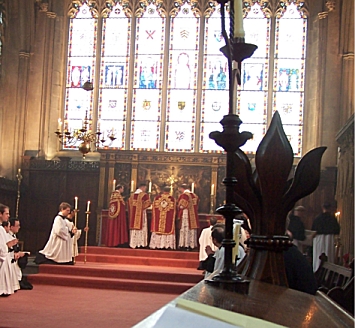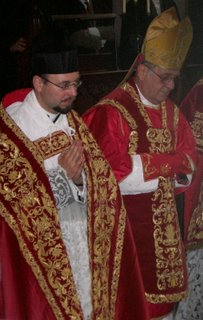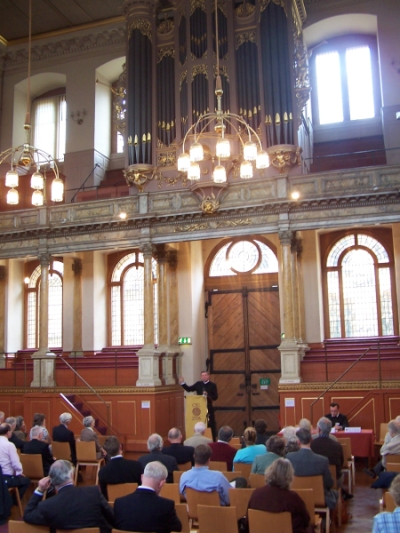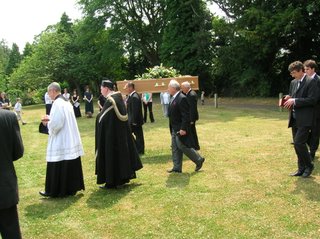In the light of continuing confusion over the question of the 'other' sacraments, and whether they can be celebrated according to the liturgical books of 1962, here are some relevant documents.
For the wording of the motu proprio
Ecclesia Dei Adflicta, (July 2nd 1988) see
below. It refers to the beneficiaries of its concessions as '
those Catholic faithful who feel attached to some previous liturgical and disciplinary form of the Latin tradition', and
'those attached to the Latin liturgical traditions' - formulations which are clearly not limited to the Mass. This is reflected in the foundation documents of the Traditional orders, starting with the Fraternity of St Peter in the same year (1988), right up to the recent establishment of the Institute of the Good Shepherd (September 2006).
10 September 1988In virtue of the faculty granted to it by the Supreme Pontiff John Paul II, the Pontifical Commission Ecclesia Dei concedes to that which is called the "Fraternity of St. Peter", founded July 18, 1988 and declared of "Pontifical Right" by the Holy See, the faculty of celebrating Mass, and carrying out the rites of the sacraments and other sacred acts, as well as fulfilling the Divine Office according to the typical edition of the liturgical books in force in the year 1962; namely the Missal, Ritual, Pontifical, and Roman Breviary. This faculty may be used in their own churches or oratories; otherwise it may only be used with the consent of the Ordinary of the place, except for the celebration of private Masses.
Anything to the contrary not withstanding.
From the seat of the Pontifical Commission "Ecclesia Dei", on the 10th day of September, 1988.
AUGUSTIN Cardinal MAYER
President
CAMILLE PERL
Secretary
-------------------------------------------------------------
Decree Erecting the Priestly Fraternity Of Saint Peter
18 October 1988
…
The members of the Priestly Fraternity of St. Peter, as well as other priests who are guests in houses of the Fraternity or who exercise the sacred ministry in their churches, are conceded the use of the liturgical books in force in 1962.
...
Anything to the contrary notwithstanding.
Given at Rome, from the seat of the Pontifical Commission Ecclesia Dei, this 18th day of October in the year 1988.
------------------------------------------------------------
Reconciliation of CamposDecree concerning the Personal Apostolic Administration of “St John Mary Vianney”
...
III To the Apostolic Administration is given the right to celebrate the Holy Eucharist, the other sacraments, the Liturgy of the Hours, and other rites according to the Roman Ritual and liturgical discipline used from Pope St Pius V, together with the reforms of his Successors up to Bl John XXIII.
...
Given at Rome, from the seat of the Congregation for Bishops, 18th Janurary 2002
John Baptist Card. Re
Prefect
+ Francis Monterisi
Secretary
--------------------------------------------------------------------
Institute of the Good ShepherdDecree of the Ecclesia Dei Commission
8 Sept 2006...Lastly, to members of this Institute, the Church confers the right of celebrating the sacred litugy, using, and indeed as the rite proper to them, the liturgical books current in 1962, known as the Roman Missal, the Roman Ritual and the Roman Pontifical for conferring orders, and also the right to recite the office according to the breviary as published in the same year.
...
Anything to the contrary not withstanding.
From the seat of the Pontifical Commission "Ecclesia Dei", on the 8th day of September, 2006.
Dario Cardinal CASTRILLON HOYOS.
President
Camille PERL
Secretary
-------------------------------------------------------
Confirmation has been given by Cardinal Hoyos, in correspondance with Archbishop Burke of St Louis, USA.
Interview given by Archbishop Burke, St. Louis, USA, May 11, 2006:
“However, I did have some correspondence with Dario Cardinal Castrillon Hoyos, the president of the Ecclesia Dei Commission, because a question was raised to me regarding the validity of the celebration of the other sacraments other than the Holy Mass according to the rites in force in 1962.
Apparently, among some people somewhere, this question arose. They believed there was no permission to do this, and what is more, if a bishop or priest was doing this, that these celebrations were not valid.
Now, as a canonist, and being somewhat versed in sacramental theology, I knew that this could not be possible because these rites were celebrated for centuries, and were valid celebrations. It could be that if the Pope had forbidden it, that it wouldn’t be licit. In other words, it wouldn’t be licit to celebrate those rites, but they would certainly be valid.
Because this is something that is very important, and something we need to be very clear about, I wrote to Cardinal Castrillon Hoyos. He wrote me back a very encouraging letter, and he assured me that it was indeed the mind of the Holy Father that bishops be generous in permitting the celebration of all the sacraments in the former rites. So that question was answered for me.
He told me in the letter that I should certainly feel free to share this communication with any bishop who inquired, or who I thought would be interested in it.”
For the full text of the interview,
see here.
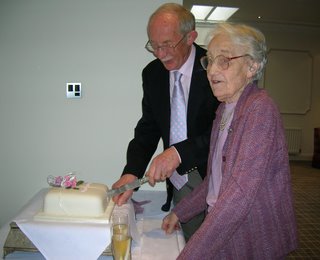 Penelope Renold, 5th May 1916-25th June 2006
Penelope Renold, 5th May 1916-25th June 2006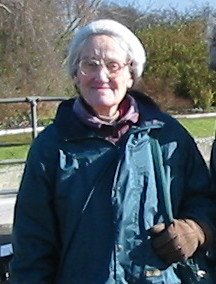 nd establishing the St Pius V Information Centre, an apostolate she sold in 1978 to what is now the
nd establishing the St Pius V Information Centre, an apostolate she sold in 1978 to what is now the 